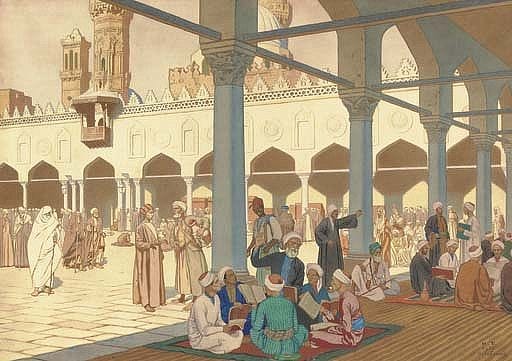Borden: Cairo for Christ
Egypt of 1913 Unrecognizable Today
The following article features in this episode of the China Compass Podcast.
El Azhar proved to be fascinating, with its white-turbaned students, nine or ten thousand of them, from many lands, including Russia, Persia, North and Central Africa, Abyssinia, India, and Arabia, and a couple hundred professors (sheikhs), every one of whom had spent at least twelve years studying in the university itself!
Old as it was, dating from the tenth century, and entrenched in Muslim bigotry and pride, it was not unaffected by the Christian influences at work around it. Only a few months before Borden’s coming, an article had appeared in a religious paper in which one of its professors had written,
Do not say that it is impossible to convert an Azhar sheikh and bring him to Christ, for with God all things are possible. Was I not a fanatical sheikh in El Azhar, and was I not by God’s grace converted? Today I pray that my fellow sheikhs may be won even as I was.
Numbers of students were attending the Monday meetings for Muslims that winter, at which Michael Mansour was speaking in great power. “Mighty in the Scriptures and in the Koran as well,” he was attracting great crowds. A foreign missionary was always in the chair, to keep order, and Borden was soon in his element distributing Arabic Scriptures and tracts.
From the YMCA it was no great distance to the American Mission where Dr. Zwemer lived, and where these Monday-evening meetings were held, or to the compound of the Church Missionary Society at which a good deal of Borden’s time was spent.
Dr. Zwemer would later write of Borden:
I never saw a man come to Egypt with eyes more open to see the kingdom of God. Other men come to see the dead pharaohs, to study history, or to join the great company of tourists all over the land, never once lifting their eyes to see the fields “white unto harvest.” Borden had not been in Cairo two weeks before he organized the students of the theological seminary to attempt a house-to-house canvass with Christian literature for the whole city with its eight hundred thousand people.
Here was a man with the frame of an athlete, the mind of a scholar, the grasp of a theologian as regards God’s truth, and the heart of a little child, full of faith and love; a man who was so tender in the relations of homelife that our children used to nestle upon his knee as if they had known him for years – and he a comparative stranger. . . .
Knowing that he had to learn Chinese, he came to Cairo to perfect himself in Arabic. Some people shrink from the foreign field, questioning, “Could I learn the language?” Here was a man who deliberately set before himself the task of learning not one but two of the most difficult languages in the world, before entering upon his lifework of declaring the unsearchable riches of Christ to Chinese Muslims. . . .
It's hard to imagine a young missionary hitting the ground running in a Muslim nation today quite like William Borden did in Egypt in early 1913.
This is the 6th in a series on the life of William Borden, the millionaire missionary who died en route to China's Gansu Province, adapted from his biography (Borden of Yale: www.Bordenbook.com), which I helped edit for republication (Aneko Press, Jan 1, 2024).



